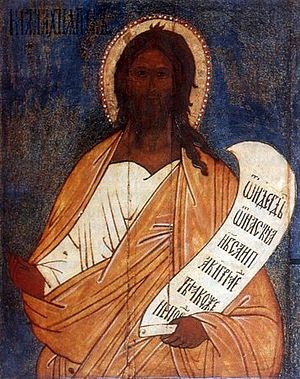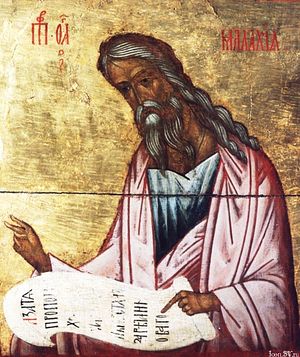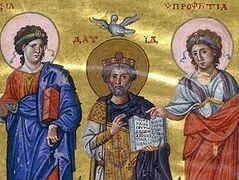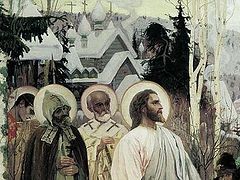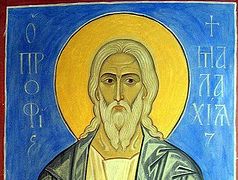Malachi was the last of the Old Testament Prophets, which is why the holy fathers call him the “Seal of the prophets”. After him, until John the Forerunner whom he prophesized, for a whole 400 years there were no great prophets in the world.
It is no coincidence that the Orthodox Church celebrates the memory of the prophet Malachi on January 3/16, three days before the Baptism of the Lord—the time of the appearance in the world of the great triumph and miracle: the Theophany of the Holy Trinity, so long awaited by the holy Patriarchs and prophets of the Old Testament world. The Church also honors by this John the Forerunner, who baptized the Savior of the world in the waters of the Jordan.
Nothing is known about the life of the prophet Malachi himself. We don’t even know the prophet’s real name, because the name Malachi, which means Angel or Emissary of the Lord, may possibly be a name applied to him for his virtuous and righteous life. Fragmentary information shows that the saint was of the tribe of Zebulon and lived after the Jews’ return from Babylonian captivity, during the time of Nehemiah, when the Jerusalem temple was rebuilt.
Malachi lived during an era of disappointment and unrealized hopes among the people of God. The great promises connected with the pre-captivity prophets and their return from captivity had not been visibly fulfilled. The life of those who returned from captivity was not easy. The Jews were politically subjects of Persia. The harvests in the fields were poor due to a plague of locusts. The hearts of the former captives were overcome by indifference to God or even “resentment” of Him. They had lost their faith in Israel’s chosenness, and thus indifference had increasingly penetrated into the temple and for the sacrifices.
They had begun more and more to violate the laws of Moses concerning sacrifice and tithing, and this applied not only to the laity but also to the priests. Temple services had been relegated to traditional rites, performed out of habit. Possibly after their return, due to their poverty the people brought the “blind, lame and sick” as sacrifices, and the priests agreed to accept them out of mercy. But then this became business as usual; they started thinking that it’s all the same to God, since He had not punished them for this.
Testimony to the thesis that the Jews’ hope in the promises had waned is their marriages to pagans, for whose sake they had abandoned their own wives, along with the general moral laxity in society. The people had left God and lost their faith.
Malachi’s words are addressed to people who were overcome by skepticism and apathy. They did not believe in the promises and did not strive to live according to them. The goal of the prophet’s service was to light the lamp of faith in a people that had fallen in spirit, remind them of God’s love that had chosen them, and strengthen the resolve of those who truly know God to fulfill their duty with regard to the promise.
Like Haggai and Zachariah, Malachi gives primary meaning in the life of the people to the temple, which had only recently been rebuilt. He was convinced that all the Jews’ prosperity depends on whether or not their service in the temple strictly corresponds to the spirit of the commandments, whether it is reverent. From this proceeds his very severe demands upon the priests.
The general thought in the prophet Malachi’s speech is a protest against negligence in the work of divine services. Malachi especially chastises those priests and Israelites for their lack of the fear of God in lightly annulling their marriages with their lawful wives. The holy prophet threatened them with God’s judgment for other vices also: for sorcery and adultery, for false oaths, for withholding the pay of their hired workers, for oppressing widows and orphans, for spurning strangers, and for not fulfilling the law of tithing and offerings to God’s temple: Will a man rob God? Yet ye have robbed me. But ye say, Wherein have we robbed thee? In tithes and offerings (Mal. 3:8).
But by his chastising sermon the prophet Malachi wants not only to support the restoration of morality in the people and their customs of true worship of God; his main goal was to prepare the people for the coming of the Lord. Many impatient Jews had already begun to doubt whether the Messiah, Who had been earlier foretold by the prophets as the Judge of sinners and the Benefactor of the righteous, will truly come. The Prophet Malachi announces that the Lord will come unexpectedly, that He will be as the Judge of all people, and includes the Jews. However, both the priests and the simple folk could not have withstood the trial by fire to which the Lord would subject everyone at His coming if He had not in His condescension for the chosen people sent them His great messenger—a new Elias, who would again be sent to earth. The meaning of this prophecy is revealed in Christ the Savior’s words about John the Baptist, who prepared God’s people for the coming of the Messiah (Matt. 11:14). The very image of the Forerunner is taken from the custom of sending messengers to Persia before the coming of the king, in order to worthily prepare the meeting of the king. But if the messenger comes and they are not prepared, then the Lord “comes unawares.” In this is revealed the main theme of the prophet Malachi—to prepare the Jews for the coming of the Forerunner—the new Elias, who is to turn the Jews to the way of salvation (Mal. 3:1).1
After the judgment, the Prophet foretells the spreading of God’s glory before all nations.
Yet another important difference in the book of the Prophet consists in the fact that Malachi views the pagans in a completely different way as opposed to the two prophets who returned from Babylonian captivity, Haggai and Zachariah. He hates only the Idumeans (the Jews’ inveterate enemies); but concerning all the other pagan peoples, he foretells that they will be accepted into the Kingdom of God. For Haggai and Zachariah, the Day of the Lord destroys all the pagans, while for Malachi it concerns only the Jews.
The prophet Malachi is especially distinguished by his particular reverence for all the weak and insulted—especially for the abandoned wives. He is a fierce enemy of divorce. Priests abandoned their wives, and the wives came to weep in the temple. For this, prophesied Malachi, God will cease accepting the sacrifices of the treacherous husbands.
Remarkable is Malachi’s sternness with regard to the matter of mixed marriages and divorce. The Law only forbade marriage with the Canaanite women, but Malachi forbids marriage with foreigners altogether. The new, final Jewish community should have more strictly preserved its theocratic isolation in order not to dissolve in paganism. Moses allowed divorce in specific circumstances (Deut. 24:1), while Malachi forbids it altogether, which is getting closer to the Gospel spirit (Matt. 19:8–9).
The book of the prophet Malachi is the last canonical book of the Old Testament. The Old Testament ends with the point upon which begins the telling of the New Testament: with the sermon of St. John the Forerunner.
In its prophecy about John the Forerunner, about the coming of Christ to the temple, the last book of the Old Testament places us upon the threshold of the New Testament. At this, the voice of prophecy goes silent. The Lord said it all, the whole possible fullness of the Old Testament revelation has been given, and all that remains for Jerusalem is to know the “day of its visitation”.
The holy prophet Malachi died young, and according to tradition was buried with his ancestors in his native village of Sufa.

